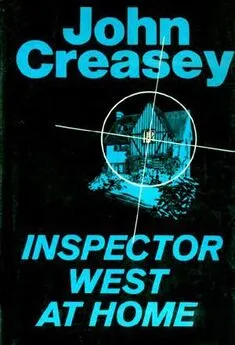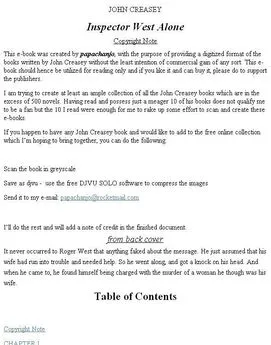John Creasey - Send Superintendent West
- Название:Send Superintendent West
- Автор:
- Жанр:
- Издательство:неизвестно
- Год:неизвестен
- ISBN:нет данных
- Рейтинг:
- Избранное:Добавить в избранное
-
Отзывы:
-
Ваша оценка:
John Creasey - Send Superintendent West краткое содержание
Send Superintendent West - читать онлайн бесплатно полную версию (весь текст целиком)
Интервал:
Закладка:
She fetched a glass from the tray, then put the tablets to his mouth one at a time, and gave him a sip of water after each. His teeth touched her palm as she tipped his head back gently and the tablets went into his mouth.
He was trying to explain away her arrival, to make out an easy, satisfactory case for it, although he was beginning to doubt the part she was playing.
She stood back, with the glass in her hand.
“Roger, you had me worried, and you still look terrible.” But she said that light-heartedly. “You need a doctor this time.”
She was relieved about something, and it could hardly be about him. She couldn’t have any real concern for him. Could she? He wished that he had his wits about him, that he could toss the urgent questions at her without making it clear that he had doubts.
“I’m all right.” He wanted to ask her again how she had discovered this address, but didn’t.
Lissa moved across to Shawn. Beauty and the beast — yet the man had seemed comparatively handsome the previous morning. Dishevelled hair, black stubble, the big slack mouth and the closed eyes all detracted from his looks. Lissa, who had been bending over him, shrugged and turned away.
“I followed him, of course,” she said. “I was to look after him, remember. He must have had a message before you tapped the telephone wire. There were three of us at the house tonight,” she went on, moving towards Roger. “Let me help you up — that club chair will be more comfortable, you can stay there until a doctor comes. I’ll telephone. One of the three had to stay, in case Belle had a visitor. Shawn discovered the other was following him, and he did his window trick again. Nearly! He didn’t see me. There’s been a nasty accident, at the corner — a man crushed to death. There was some trouble getting through, but David managed to pass. I had a bigger car. I didn’t want an argument with your police, anyway, so I left the car and walked.”
She pulled him up, gently, although he could have managed by himself now. They began to walk across the room, and she slid an arm round him. He didn’t need support but he didn’t object.
“I saw David come down this road, but had to leave the car and walk from the corner. I was twenty minutes or so behind him, and wasn’t sure this was the house — or that David was still here, even if it was. Then I heard voices, and recognized his. I went round the house to try to get in, but all the doors were locked, and I daren’t break a window then. I didn’t know how many people were inside. Now, easy, Roger. Pull on me.” His back was to the easy chair, and she gripped his hands; she was slender as a sapling, but strong enough to hold him steady as he lowered himself gently. The upholstered chair was much more comfortable. “Now I’m going to ring for a doctor,” she said, “and then I’m going to bathe your poor head again.”
“The telephone is out of order,” Roger croaked.
She didn’t speak, but took the bowl of water, pink with blood, and went out
She had told half the story, convincingly; in those swift, coherent sentences, interrupted only by orders to him. It had been told as the truth might be told, casually, without concentration, just between pauses when she wanted to do something else. If she could explain what she had done after that half-hour, he would be satisfied.
He heard her coming back.
12
OFF DUTY
SHE came towards Roger, carrying the bowl, and the sight of her did much to melt the ice of suspicion. She smiled, as if he were the only man to know her favour. Something in her look told him that she guessed what he was thinking, that it amused her, and she was ready to indulge him. In some curious way she made him feel that she regarded him as precious; hers.
And then a man came out of the garage,” she went on, taking up the story as if she’d never broken off. “He must have seen me prowling. He kicked a stone, or I wouldn’t have known he was there. I turned and ran. He blundered after me, and we played hide-and-seek among the trees and the bushes over there.” He knew there was a patch of bushes, laurel, rhododendron and hawthorn, at one side of the garden. “I didn’t enjoy it,” she went on, and meant that she was terrified. “It was like being stalked by a big cat. It’s a lonely place, Roger. Then there was a shot from the house, and the man went rushing across to see what had happened. I caught my coat on some thorns.”
Yes, her coat had several tiny tears in it.
“It seemed hours before I got free,” she went on, “and before I went to the house they drove off in a car. I saw two men, anyhow. David’s car was there, with the ignition key still in it, so I got in and followed them.”
And he had suspected her!
“Did you —”
“The car was difficult to start, and that delayed me; I knew I couldn’t catch up with them, so I drove back here. It’s been quite a night, Roger.”
“Quite a night,” he echoed faintly. All this, and plainclothes men had been nearby; they would hear plenty soon.
“I’m a fool,” Lissa said. “You must be cold.” She hurried out of the room, and he heard her running up the stairs, walking overhead, then running down again. Her story didn’t account for the man in the dining-room, but if there had been one outside there might well have been another, who could have got in and reached the dining-room, keeping quiet after Roger had moved from the cupboard under the stairs.
Lissa brought blankets, wrapped them round him, tucked them in, bathed his head once again; and all the time gave the impression that only he mattered.
“Now I’ll make you some tea,” she said. “Or would you prefer coffee?” From the door, she asked: “What should happen, after I flashed that light?”
“Chief Inspector Sloan should soon be here.”
In fact, Sloan arrived as Roger was sipping hot, sweet coffee, and as Lissa was standing in front of a mantelpiece mirror, drawing a comb through her hair with slow, almost sensual movements. Sloan had two plain-clothes men with him. He had come across the river in a launch, held ready, and been prepared for trouble. Roger didn’t like his expression; and one of the others looked as if he were suffering from shock. Roger didn’t tie that up with the accident Lissa had mentioned.
He didn’t know anything more about the accident until the doctor arrived, to examine his head wound. An incautious remark earned a scowl from Sloan, and told Roger something was badly wrong. Once he forced questions, Sloan didn’t hold out. The two plain-clothes men who were “soon going to hear plenty’ had been patrolling the main road right and left from the private road, there simply to watch and report all comers. They met every fifteen minutes, to compare notes. They had been comparing notes when a car had run into them. One was dead, and with the other it was touch and go.
All of this was in keeping with the tempo of the crimes. Drugging, kidnapping, a slashed throat, now crushed and broken bodies. The car was a hired car, the driver had escaped. The “accident” must have happened just after Shawn had arrived. No one was known to have seen Gissing and then Shawn come — except Roger. There seemed little doubt that Roger had been left for dead.
As he listened, with a thick towel round his neck while the doctor snipped blood-matted hair, Lissa was stand-in for a nurse.
“You’d better have a bandage,” the doctor said, “ You won’t like it, but you need it. The cuts aren’t too bad, I don’t think anything’s cracked. Might X-ray, to make sure. What you need is rest.”
“I can’t rest.”
“You try getting about,” said the doctor ominously, “and you’ll go out on your feet.”
“I’ll take you home,” Sloan offered.
No one asked the obvious question, which was stabbing into Roger’s mind. They had killed Ed, crushed the watching police, yet they hadn’t killed him. Why not? Had they left him for dead? One shot or one slash with a knife would have made certain, but they hadn’t been ruthless with him.
He had to be helped to Sloan’s car, and helped inside. His head seemed twice its usual size, and it kept lolling about. Sloan held one of his arms, Lissa the other. When he was in the car Lissa tucked blankets round him, and her touch comforted.
“Take care,” she said. “Do what they tell you, Roger. Goodnight.”
“Goodnight,” Roger replied.
Sloan moved off, cautiously, and they were past the scene of the accident and on the way to Hammersmith Broadway before he spoke. Then it was almost to himself, wonderingly; and it wasn’t about the slaughter.
“Some woman,” he said.
Roger didn’t answer.
• • •
Whether he liked it or not, Roger knew he would be off duty for forty-eight hours, and it might be much longer. He was hazy about what happened after he reached Bell Street. Janet had been warned, everything was ready, Sloan helped her to undress him and get him to bed, the doctor looked in and gave him a shot which blacked everything out He was only vaguely aware of Janet’s ministrations, of light and movement, and he couldn’t think clearly, although he knew that there was plenty he ought to think about. He was cut off from the case of a missing child and tormented, half-demented parents, and that all-compelling reason for secrecy.
He hadn’t even asked Sloan or anyone else whether Marino had agreed to giving a hand-out to the Press.
• • •
Roger slept until after midday. When he awoke he felt much better, his head now shrunk to proper size, and only a threat of pain when he moved it, or when he ate and drank. Janet knew there was no hope of keeping the newspapers from him, and had bought all the dailies. In each there was a picture of Ricky Shawn, and a story which told the world this was kidnapping for money. There was a picture of Belle Shawn, too, a laughing picture of a lovely woman. There was none of Shawn. The papers told Roger nothing, except that he’d had his way. Reading, he was teased by an uneasy thought, that he had forgotten something significant — something he’d heard which could be a key to the puzzle.
Marino telephoned to inquire after him, so did Hardy. He expected a message from Lissa, but it didn’t come. Sloan looked in, told him that Shawn had been taken away from “Rest” by two men who arrived from the Embassy; Sloan didn’t know what had happened to Shawn. The blanket of official secrets fell like a dead hand on the case. Roger felt irritated and glum, and put it down to the obvious — that the Yard had been consulted but wasn’t being allowed to work properly. The Yard should have tackled Shawn. The Special Branch or even MI5 might be working on the case with the Americans, of course — but if so, why had the Yard been consulted in the first place?
With time to think without the pressure of events chasing him, Roger thought he understood. In the early stages the Yard had been needed, to deal with the local police, neighbours, everything. If he hadn’t been injured he would probably still be working on it, but by the time he was able to get about again, the case might be over.
That forgotten factor still teased him.
Now and again, resting and even dozing, his body would grow tense. An image of Gissing’s face in the doorway of the dining-room would come, showing all the evil and the dead-liness. As Lissa was beauty, so was Gissing ugliness; corruption. It was thinking extravagantly, but he couldn’t rid himself of the thought Gissing — corruption. In the moment of revelation the man had been stripped of the veneer covering his unholy, deadly self.
Читать дальшеИнтервал:
Закладка:










